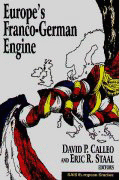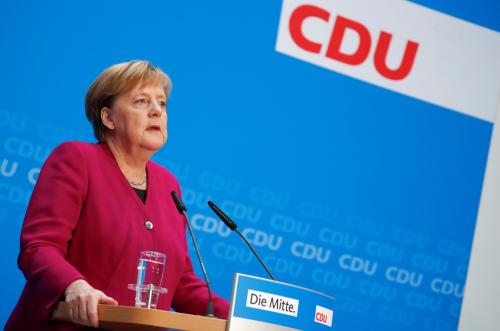Have Angela Merkel and Annegret Kramp-Karrenbauer dealt the final death blow to German machismo? Constanze Stelzenmüller explains, in a piece originally published in the Washington Post.
I’m no fan of reducing complex political and social processes to a question of gender. But. It’s a fact that a diminutive working mother of three has just made German postwar history by becoming the first woman to succeed another woman as leader of a major political party. Annegret Kramp-Karrenbauer (or AKK, because even Germans feel life is too short for names with eight syllables) is the new chairwoman of the center-right Christian Democratic Union (CDU). She follows on Angela Merkel, who had led it for 18 years.
The handover raises compelling political questions. What does this mean for the future of the country’s increasingly fragmented party system? Does Kramp-Karrenbauer, 56, have what it takes for the next step—succeeding Merkel as chancellor, in an international environment that may be the most challenging a German leader has ever seen?
Yet judging by much of the commentary, the far more consequential issue is what this shift presages for the future of the nation’s manhood. Have—shudder—Merkel and Kramp-Karrenbauer dealt the final death blow to German machismo?
The track record is, well, suggestive. Postwar West German politics were dominated by larger-than-life titans who smoked, drank and womanized, reveled in political combat, and generally oozed a thick fug of testosterone. This was particularly true of the four chancellors who ruled between 1969 and 2005: Willy Brandt, Helmut Schmidt, Helmut Kohl and Gerhard Schroeder. Add the last’s streetfighter-turned-foreign-minister Joschka Fischer, and they total 16 marriages between the five of them. (To be fair, it is easy to forget that Germany’s male population had been decimated by two world wars. This was the rambunctiousness of survivors in a world without fathers.)
So Merkel, the daughter of an East German Protestant pastor, taking over the party leadership in 2000 was a jarring shock to a male-dominated and mostly-Catholic CDU debilitated by a financing scandal. When Kohl refused to step down, it was Merkel—and not one of the dozen or so young conservative “warlords” who were jostling for the succession—who felled him in one swift bite to the jugular with a front-page newspaper article calling for his resignation.
A generation earlier, the clever grocer’s daughter Margaret Thatcher had ripped into Britain’s smug conservative establishment with a gale-force combination of vicious class resentment and sexy ankles. The male contingent of the Tory party has arguably never quite recovered—as evidenced this week by its latest abject failure to unseat Prime Minister Theresa May.
Merkel found herself at the turn of the millennium confronting a generation of similarly entitled and complacent middle-aged German conservatives; the elusive female of the species came wreathed in deference and pearls. Trained to navigate limited sovereignty and accustomed to following orders and convention, her CDU peers were disoriented by the confusing new post-Berlin Wall world.
For Merkel, it was liberation. And it must have been intoxicating. Moreover, she had grown up in a Communist country where most women worked and had families, whereas in postwar West Germany, women with children who shyly expressed a desire to work risked being called Rabenmütter—basically, unnatural mothers. Even in 2000, Germany was well behind other Western democracies in that it had never had a female chancellor, foreign minister or defense minister, and its constitution prohibited women from serving in the armed forces (except as doctors or members of a military band).
Today’s Germany is still quite a ways from equal pay for women, or parity of representation in legislatures or on corporate boards. But some of the Bundeswehr’s combat units are commanded by women. Ursula von der Leyen is the defense minister, and women are either leading or co-leading all except two of Germany’s political parties. Merkel has been chancellor for 13 years. During her time in office, she has presided over the extension of paid parental leave and the legalization of same-sex marriage. Those male rivals from her early days have, one by one, displayed a remarkable tendency to come to grief of their own accord.
At last weekend’s leadership convention, Kramp-Karrenbauer and her main opponent, Friedrich Merz, represented genuinely competing visions for the future of the party and the country: big-tent centrism versus a pivot to the right; a European focus versus a strong Atlanticist bent. But the contest also had startling overtones of gender warfare.
In an irony lost on no one in Germany, Merz—a millionaire corporate lawyer and one of those young conservative “warlords” pushed out by Merkel—was narrowly defeated by her chosen successor. His most important backer was another Merkel foe with an ax to grind, the CDU’s grand old man Wolfgang Schäuble. Functionaries and pundits opined darkly that “another woman” in the top job would be the last straw. Members of the CDU womens’ grouping Frauenunion, meanwhile, were wearing what J.R.R. Tolkien would have called a “fell gleam” about their brows.
After the vote, a journalist had to apologize for tweeting “yet another white, old, ugly woman.” He tried to explain that is had been a “joke.”
Machismo is alive and well in my country. Nonetheless, the CDU is now headed by a woman who has twice won elected office as the German equivalent of a state governor, resigned, rejected a cabinet post to serve instead as her party’s secretary general, and vaulted to the top position only nine months later with a cheerfully combative performance at the convention. In a time where strongmen and authoritarians around the world are attempting to denigrate and subordinate women, I’ll take that as good news.
Now can we get back to the politics?
The Brookings Institution is committed to quality, independence, and impact.
We are supported by a diverse array of funders. In line with our values and policies, each Brookings publication represents the sole views of its author(s).









Commentary
Succeeding in German politics while female
December 17, 2018